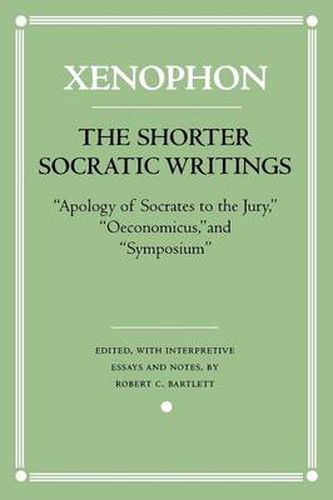Readings Newsletter
Become a Readings Member to make your shopping experience even easier.
Sign in or sign up for free!
You’re not far away from qualifying for FREE standard shipping within Australia
You’ve qualified for FREE standard shipping within Australia
The cart is loading…






This book presents translations of three dialogues Xenophon devoted to the life and thought of his teacher, Socrates. Each is accompanied by notes and an interpretative essay that will introduce new readers to Xenophon and foster further reflection in those familiar with his writing. Apology of Socrates to the Jury shows how Socrates conducted himself when he was tried on the capital charge of not believing in the city’s gods and corrupting the young. Although Socrates did not secure his own acquittal, he profoundly impressed some listeners who then helped to shape the public perception of philosophy as a noble, if highly idiosyncratic, way of life. In Oeconomicus, Xenophon relates the conversation Socrates had on the day he turned from the study of natural philosophy to that of moral and political matters. Oeconomicus is concerned most directly with the character and purpose of Socrates’ political philosophy. Xenophon provides entertaining portraits of Socrates’ circle of friends in the Symposium. In the process, he conveys the source of every individual’s pride in himself, thus defining for each a conception of human excellence or virtue. The dialogue concludes with Socrates’ beautiful speech on love (eros) and its proper place in the good or happy life.
$9.00 standard shipping within Australia
FREE standard shipping within Australia for orders over $100.00
Express & International shipping calculated at checkout
Stock availability can be subject to change without notice. We recommend calling the shop or contacting our online team to check availability of low stock items. Please see our Shopping Online page for more details.
This book presents translations of three dialogues Xenophon devoted to the life and thought of his teacher, Socrates. Each is accompanied by notes and an interpretative essay that will introduce new readers to Xenophon and foster further reflection in those familiar with his writing. Apology of Socrates to the Jury shows how Socrates conducted himself when he was tried on the capital charge of not believing in the city’s gods and corrupting the young. Although Socrates did not secure his own acquittal, he profoundly impressed some listeners who then helped to shape the public perception of philosophy as a noble, if highly idiosyncratic, way of life. In Oeconomicus, Xenophon relates the conversation Socrates had on the day he turned from the study of natural philosophy to that of moral and political matters. Oeconomicus is concerned most directly with the character and purpose of Socrates’ political philosophy. Xenophon provides entertaining portraits of Socrates’ circle of friends in the Symposium. In the process, he conveys the source of every individual’s pride in himself, thus defining for each a conception of human excellence or virtue. The dialogue concludes with Socrates’ beautiful speech on love (eros) and its proper place in the good or happy life.